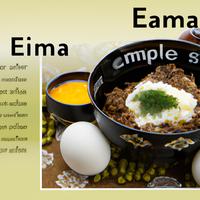
1 serving (100 grams) contains 121 calories, 11.9 grams of protein, 5.2 grams of fat, and 9.9 grams of carbohydrates.

Log this food in SnapCalorie

Nutrition Information
Calories |
302.5 | ||
|---|---|---|---|
% Daily Value* |
|||
| Total Fat | 13 g | 16% | |
| Saturated Fat | 1.8 g | 9% | |
| Polyunsaturated Fat | 0 g | ||
| Cholesterol | 0 mg | 0% | |
| Sodium | 15 mg | 0% | |
| Total Carbohydrates | 24.8 g | 9% | |
| Dietary Fiber | 13 g | 46% | |
| Sugars | 5.5 g | ||
| protein | 29.8 g | 59% | |
| Vitamin D | 0 mcg | 0% | |
| Calcium | 157.5 mg | 12% | |
| Iron | 6.2 mg | 34% | |
| Potassium | 1090 mg | 23% | |
* Percent Daily Values are based on a 2,000 calorie diet. Your daily values may be higher or lower depending on your calorie needs.
Food Attributes
Source of Calories
About Edamae
Edamame, young soybeans harvested before fully maturing, are a popular snack originating from East Asian cuisine, particularly Japan, China, and Korea. Typically served steamed or boiled in their pods, they offer a mild, nutty flavor and are often sprinkled with salt or flavored with spices. Packed with nutrients, edamame is an excellent source of plant-based protein, fiber, and essential vitamins such as folate and vitamin K. It also provides vital minerals like iron, magnesium, and calcium while being low in calories. Edamame is rich in heart-healthy unsaturated fats and contains isoflavones, compounds linked to improved bone health and balanced cholesterol levels. However, individuals with soy allergies should avoid it. As a healthy addition to meals or snacks, edamame contributes to satiety and supports muscle growth, weight management, and overall wellness when consumed as part of a balanced diet.



